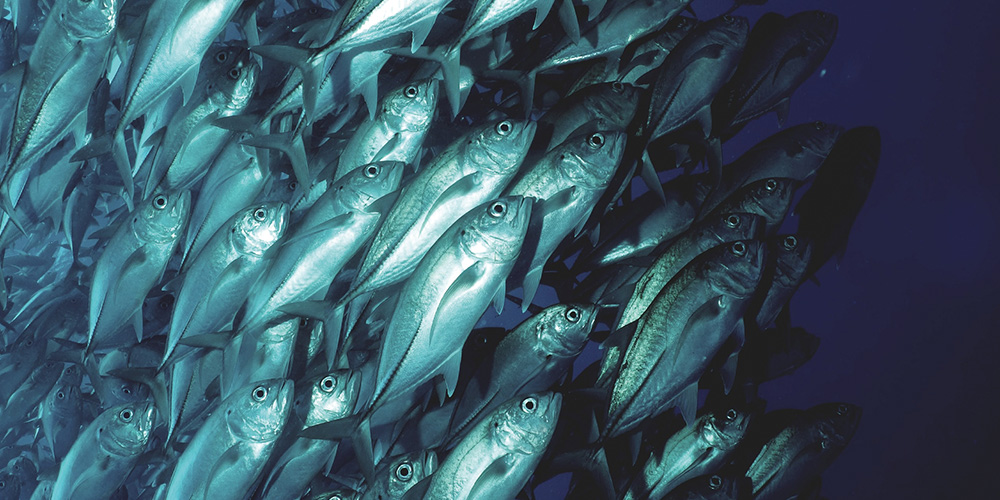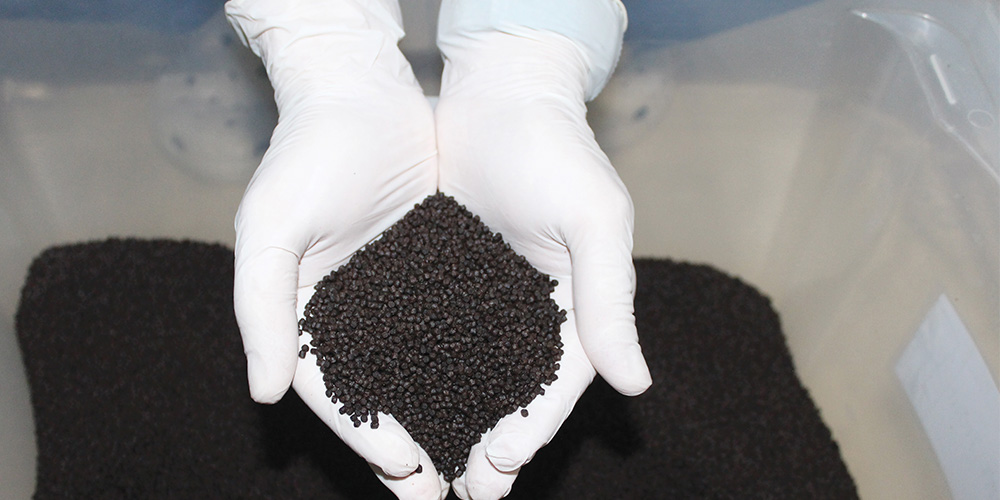Processing fish and seafood is wasteful. Malta’s researchers join a collaborative project which brings academic institutions, governmental entities, and SMEs together to reduce that waste. Dr Alexia Massa-Gallucci and Manya Russo from AquaBioTech Group tell the story.
Oceans cover 70% of the Earth’s surface. Millions of marine organisms are an important source of food, as well as bioactive substances to make pharmaceutical products and cosmetics. Much of their mass is lost during processing, propelling the demand for raw materials. With fewer losses, the demand for fresh fish would decrease.
Wild caught and farmed fish are an essential source of animal protein, providing some people with up to half of their daily protein. Since the 1960s, the annual global fish consumption has grown two times faster than the world’s population. Between 1961 and 2015, consumption more than doubled, from 9kg to 21kg per capita. In 2016, global fish production reached 171 million tonnes, shared between fishing and aquaculture. Around one eighth went towards purposes other than people’s food.
A Noxious Problem
Fish meal and oil are the most nutritious and digestible ingredients for livestock feeds, both in aquaculture and agriculture. To produce a stable supply of fish meal and fish oil, already overfished species like mackerel or anchovies are caught each year to satisfy the demand. This demand for fish protein has given a boost to fish processing industries, but it also creates a lot of waste.
The fisheries and aquaculture industries discard between a third and a half of the fish mass they process. Moreover, hospitality establishments and restaurants are notoriously wasteful. Proper handling and fish product preservation would reduce waste.

Fish waste is mostly internal organs, skin, bones, cut-offs, and spoiled or damaged fish. Although they are organic, they are a huge environmental problem. Firstly, processing waste needs energy. Secondly, waste thrown overboard lowers oxygen levels in sea waters, smothering living organisms at the sea bottom and upsetting the marine ecosystem. But in a circular economy (see THINK No. 30), these by-products could become useful materials, such as bioactive compounds, collagen, fatty acids, fish meal, and fish oils. They could find their niche in the food, pharmaceutical, nutraceutical, and cosmetic industries, transforming fish production industries into more environmentally sustainable ones that avoid pollution.
Malta and Italy have long-standing fisheries traditions. To turn fish waste into a resource, a consortium of Maltese and Italian partners came together and received funding from the Interreg V-A Italia-Malta Programme, founding the BYTHOS project that wants to use biotech innovation to improve sustainability and human health.
The consortium, led by Universita’ degli Studi di Palermo (Italy), brings together biotechnology experts with business and industry professionals, as well as governmental bodies. The project team is working on biotechnologies to extract high-added-value compounds from fish waste. Doing so will create a business space where research and local enterprises can meet to promote investment in innovation, generating businesses and jobs. Showing the commercial value of fish waste will encourage the fishing industry and food services to become cleaner and less wasteful.
Waste turned into gold
Consider this: fish waste proves to be an extremely valuable source of bioactive molecules, marine collagen, omega fatty acids, and fish meal. Within the BYTHOS project the University of Palermo is developing protocols to extract these useful substances. Researchers have already extracted bioactive molecules that can be used in cosmetic products and other industries.
Another valuable compound from fish offal is marine collagen. Currently the University of Malta is working on extracting collagen, which is used in food, cosmetics formulations, and in medicines. Hydrolised collagen (gelatin) has many applications in scientific research labs and the pharmaceuticals industry.

Restaurants discard anchovy residues, tuna offal, and mixed fish waste, which could be used to make fishmeal and fish oils. The BYTHOS team wants to use fish meal produced at the University of Palermo and the Ministry for the Environment, Sustainable Development and Climate Change’s (Malta) facilities to produce innovative fish feed. AquaBioTech Group, the enterprise representative in the project, is testing it at the company’s Recirculation Aquaculture Systems facilities on a number of fish farm species. The tests will help evaluate the product’s quality. The University of Palermo is also investigating the possibility to use omega-3 and -6 oil to produce food supplements.
The project provides business opportunities for entrepreneurs, start-ups, and established businesses in Malta and Sicily to drive innovation. With extraction protocols in place and ingredients properly characterised, fish waste products can find their market and bring profit. The business space will support the development of business plans, forecast the products’ commercial success, provide interested parties with know-how on this growing sector, and offer a networking platform. But most importantly, as different as the team members are, they all want to promote the circular economy, and more sustainable, cleaner industries.
The project BYTHOS ‘Biotechnologies for Human Health and Blue Growth’ is funded by the European Union’s Interreg V-A Italia-Malta Programme under project code C1-1.1-9. We would like to thank the BYTHOS partners: Universita’ degli Studi di Palermo (Italy), Comune di Lipari (Italy), Distretto Turistico Pescaturismo e Cultura del Mare (Italy), University of Malta (Malta), and the Ministry for the Environment, Sustainable development and Climate Change (Malta). Read more here.





Comments are closed for this article!